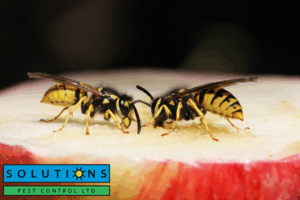Wasps are a common nuisance during warmer months, especially in areas with outdoor activity. Their aggressive behavior and painful stings make them a serious concern for homeowners and families. But many people are understandably wary about using harsh pesticides near their homes, gardens, and pets. Fortunately, there are several natural wasp repellents that are both safe and effective. If you’re wondering how to keep wasps away without exposing your family to toxic substances, this guide is for you.
Understanding Why Wasps Show Up in the First Place
Before jumping into natural deterrents, it’s helpful to know what attracts wasps. Wasps are drawn to:
- Food: Especially sweet items like fruit, soda, or food scraps.
- Nesting sites: Eaves, sheds, decks, and wall voids offer safe spaces for colonies.
- Water sources: Ponds, fountains, and birdbaths can draw them in during dry spells.
If your property offers one or more of these conditions, you’re more likely to experience wasp activity.
Top Natural Wasp Repellents to Use at Home
1. Peppermint Oil Spray
Studies have shown that peppermint oil is a powerful natural insect repellent. Wasps dislike its strong scent, making it one of the most effective solutions.
How to use:
- Mix 1 tablespoon of peppermint oil with 1 cup of water.
- Add a few drops of dish soap to help it stick to surfaces.
- Apply treatment to areas where wasps tend to gather (e.g., eaves, porch ceilings, railings).
2. Clove, Geranium, and Lemongrass Essential Oils
This trio is often used in homemade wasp repellent blends. When mixed together, these oils produce a scent that wasps find unbearable.
Application tip: Combine 10 drops of each oil with 1 cup of water in a spray bottle. Shake well and apply around entry points, outdoor seating areas, and garbage bins.
3. White Vinegar and Water Spray
White vinegar is another natural deterrent. The acidity and strong scent help keep wasps away.
Directions:
- Mix equal parts white vinegar and water.
- Spray around the perimeter of your patio, garden furniture, and outdoor cooking areas.
4. Cucumber Slices
Cucumbers contain an acidic compound that wasps dislike. Placing cucumber slices on aluminum foil can intensify the effect due to the chemical reaction that occurs.
Best for: Picnic tables, decks, and garden beds where wasps are frequently seen.
5. Citrus Peels
Citrus oils found in lemon and orange peels repel wasps naturally. Scatter fresh citrus peels in problem areas or use citrus-based cleaning products outdoors.
6. Decoy Nests
Wasps are territorial and generally avoid building nests near other colonies. Hanging up a paper decoy wasp nest in areas where nests typically form can prevent new ones from being established.
DIY tip: Use a brown paper bag stuffed with newspaper and hung under eaves or trees.
Natural Landscaping Techniques to Deter Wasps
Choose Wasp-Repelling Plants
Incorporate these plants into your landscaping for a natural wasp barrier:
- Mint
- Eucalyptus
- Wormwood
- Citronella
- Thyme
These plants not only help deter wasps but also add fragrance and beauty to your garden.
Keep Outdoor Areas Clean and Covered
One of the most effective natural methods is simply eliminating attractants:
- Cover food and drinks during outdoor meals.
- Use sealed garbage bins with tight-fitting lids.
- Clean up fallen fruit from trees and bushes.
When to Seek Professional Help
Even with these methods in place, persistent wasp activity especially near your home or children can pose a real threat. If you suspect a nest on your property or frequent wasp visits despite natural repellents, it’s time to call a wasp exterminator.
Wasp nests can be hidden in wall voids, attics, underground, or in dense shrubbery. Removing them yourself can be dangerous and ineffective if not done properly.
What Not to Use: Common Myths and Mistakes
Don’t Rely on Coffee Grounds Alone
While burning coffee grounds is rumored to repel wasps, the results are often short-lived and inconsistent.
Avoid DIY Traps Near Gathering Areas
Homemade wasp traps made from sugary solutions can attract even more wasps if placed too close to your patio or doors. If you use these, place them far away from the main living areas.
The Benefits of Natural Wasp Control
Choosing natural repellents offers several advantages:
- Safer for pets and children
- Environmentally friendly
- Cost-effective
- No harsh residue or lingering odor
Plus, many natural methods can be easily integrated into your routine cleaning and gardening habits.

Why Prevention is Better Than Reaction
Rather than waiting until a wasp problem escalates, it’s best to use preventative measures. By implementing a mix of natural repellents, good sanitation, and wasp-resistant landscaping, you can avoid infestations altogether.
And if natural methods fall short, professional pest control Langley is only a call away.
About Solutions Pest Control
At Solutions Pest Control, we understand how overwhelming it can be to deal with stinging insects like wasps. Based in Langley, BC, our mission is to deliver safe, eco-friendly pest control solutions to keep your home and yard pest-free. Whether you’re looking for wasp control near me or effective ways to handle an active infestation, our experienced team is here to help.
We specialize in proactive prevention, humane removal, and tailored pest management strategies. Our services cover a wide range of needs including insect control, rodent control, and seasonal treatment plans. As your trusted Langley pest control provider, we prioritize your safety and peace of mind with every visit.


